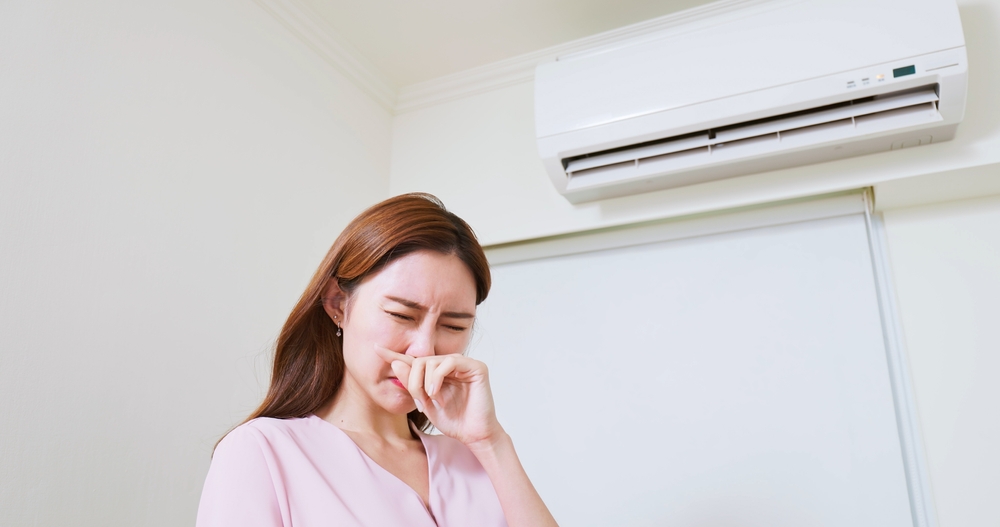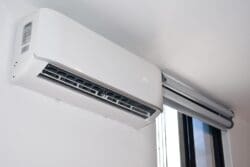
Your air conditioner is supposed to change how your air feels; not how it smells.
Is there a weird smell coming from your AC? Stop asking yourself “Why does my AC smell bad?” and let’s make ‘scents’ of it together. More than offputting, that strange odor can be a sign that something’s wrong with your HVAC system. In this article, we will list the different types of smells that malfunctioning air conditioners produce, what those smells mean, and how to fix the underlying problems.
Common Air Conditioner Smells and What They Mean
Unless you run a laundromat out of your home, it should never smell like dirty socks and chemicals. Here are some of the types of smells that you may notice coming from your air conditioner:
1) Rotten Egg or Sulfur Smell
If the air coming from your AC smells like rotten eggs, there may be a dead animal somewhere in your air ducts. Pests seek shelter in these spaces. If they pass away, their decaying carcasses may emit a sulfuric odor.
2) Chemical Smell
Synthetic, chemical smells coming from your air conditioner can likely be traced to vehicles, housekeeping supplies, or refrigerant leaks. If your AC’s intake vents are located near a garage or a utility closet, check to make sure your car’s exhaust fumes or the odors from cleaning products aren’t getting into your indoor air supply.
3) Dirty Sock Smell
Your HVAC system’s evaporator coils create a favorable environment for mold growth. If your AC smells like dirty socks, it may be time to clean or replace them.
4) Burning Smell
Sometimes described as “electrical” or “gunpowdery”, that burning smell coming from your AC may indicate overheating somewhere in the system. Check the electrical wiring and circuit board to make sure they haven’t fried. If they have, contact a professional AC repair technician who has been trained to work with electricity.
Common Causes of Bad Smells from Your Air Conditioner
Next, let’s explore the most common culprits behind these unwelcome smells and what they indicate about your air conditioner’s health.
-
Mold and Mildew Growth
Excess moisture in your HVAC system fosters the perfect breeding ground for mold and mildew, resulting in that distinctive musty odor. Regular maintenance, including biannual tune-ups and humidity control measures, is essential for maintaining good indoor air quality.
-
Clogged or Dirty Air Filters
Your air filter’s job is to trap airborne contaminants. When neglected, it becomes a reservoir of bacteria and particulates that create unpleasant odors each time your system runs. Replace standard filters every three months or clean reusable ones to prevent buildup and maintain healthier indoor air quality.
-
Refrigerant Leaks
A sweet or chloroform-like smell often indicates refrigerant leaking from your AC system. Beyond inefficient cooling, refrigerant leaks pose serious health and environmental hazards that must be addressed by certified technicians.
-
Burnt or Overheated Components
A burning smell — sometimes resembling gunpowder or a mixture of sulfur and metal — typically signals an overheating motor, electrical short, or wiring issue within your system. These situations demand immediate action. Turn off your system at the breaker box and contact a professional technician before the problem escalates.
-
Dirty Evaporator Coils
The evaporator coils in your AC system accumulate dirt and organic material over time, creating a breeding ground for bacteria and mold. Clean them to eliminate the accompanying foot-like odor and restore proper air quality in your home.
-
Clogged Condensate Drain Line
Dirt, algae, and debris can clog your air conditioner’s condensate drain, blocking moisture movement and creating stagnant conditions for mildew and bacteria growth. If not addressed, the resulting musty odors can worsen over time.
-
Standing Water in Ductwork
Humidity, leaks, and condensation issues can lead to standing water in your ductwork. Stagnant moisture generates mold-related odors that will persist until the affected areas are properly dried and cleaned.
-
Dead Animals or Pest Infestation
Perhaps the most repulsive smell — often compared to rotten eggs — is the result of animals that entered your ductwork for shelter and never found their way out. Decomposing remains in your system emit an unmistakable odor that requires professional duct cleaning to prevent future infestations.

How to Fix a Smelly Air Conditioner
While that weird smell coming from your AC can be concerning, most of its causes can be prevented or resolved with proper cleaning and maintenance. Take these steps to eliminate unpleasant odors and increase the lifespan of your air conditioner.
1) Clean or Replace the Air Filter
Remove and replace standard air filters every 1-3 months depending on your home’s usage patterns. For washable filters, follow the manufacturer’s cleaning instructions and ensure the filter is completely dry before putting it back in.
2) Check and Clean the Evaporator Coils
After turning off the power to the unit, carefully remove the access panel, apply a specialized cleaning agent or gentle soap solution, rinse thoroughly, and allow to dry completely before reassembling the unit.
3) Unclog and Disinfect the Drain Line
Clear minor clogs by pouring a mixture of equal parts white vinegar and water through the drain line. Follow it with a gentle clean water rinse to remove residue and prevent future buildup.
4) Inspect and Clean the Air Ducts
Air duct cleaning is best left to the professionals. However, you should inspect accessible sections and clean vent covers regularly to minimize odor sources and optimize airflow.
5) Eliminate Mold and Mildew Buildup
For areas where mold is visible, create a solution of 1 part bleach to 10 parts water, turn off your system, and wipe down all affected surfaces. Moisture control is essential for mold prevention. Address humidity issues in your home with a dehumidifier or improved ventilation.
6) Ensure Proper Ventilation and Airflow
Make sure your vents are unobstructed. Periodically open windows to let fresh air in your home when weather permits. You might also consider running your system’s fan mode for 20-30 minutes after cooling cycles to dry out internal components and prevent excessive humidity.
7) Schedule Professional Maintenance
Even with diligent DIY care, schedule professional maintenance at least once a year to clean hard-to-reach areas and identify minor issues before they become expensive problems. Spring is the ideal time to schedule, as it allows technicians to address developing odor sources and prepare your system for peak summer performance.
When to Call a Professional for Air Conditioner Repairs
While many air conditioner odor issues can be resolved with basic maintenance, certain situations are dangerous and require a trained professional’s expertise. Here are the scenarios when you should contact an AC installation and repair specialist rather than attempt a DIY repair:
- If you detect a burning or electrical odor, this could indicate hazardous wiring issues or overheated components.
- If you notice a sweet, chemical odor. Refrigerant leaks are harmful to your health and the environment, requiring specialized handling by certified technicians.
- If musty odors persist despite your best cleaning efforts, you may have mold growing in inaccessible areas that require professional equipment to reach.
- A deceased animal in your ductwork requires professional removal and sanitation protocols.
Having Issues with Your AC? We’re Here to Help
Wondering why your AC smells? Because you haven’t called Gulf Shore yet!
Investing in professional maintenance every spring before the intense Florida heat arrives is the most effective strategy for preventing bad smells before they start. Gulf Shore Cooling LLC’s trained technicians perform comprehensive inspections, cleaning, and preventative care to keep your system running efficiently — and your home smelling fresh — year-round.
Contact Gulf Shore Cooling LLC today for relief.



